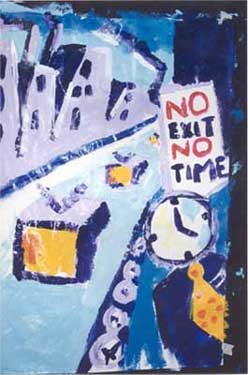|
|
|
|
|
|
|
|
|
|
|
|
|
|
|
 Gwyn Henry
Gwyn HenryWitness to an Exit Graphic: "No Exit No Time," The Artworks So one has to live with one's eyes open all the time. Garcin: No Exit, John Paul Sartre I. II. In the periphery of her vision, she sees him moving toward her on huge, shower-thonged feet. He has stout forearms and a barrel chest, and wears sweat pants several sizes too big, even for his large frame. They are stained with earth and grass, and droop in the crotch, ballooning around his thighs like harem pants. A sweater dotted with moth holes wraps his upper torso, every button fastened, from waist to chin. Swaddled, she thinks, like those Russian infants whose mothers bind them in mummy-lengths of flannel so they will feel safe. She never believed binding made one feel safe. III. She locks her eyes on the sign across the street that says pancakes & eggs, $2.99. Conventional wisdom advises her to ignore him, and yet a more deeply ingrained doctrine insists it isn't polite to ignore a direct comment, so she smiles and nods ... to which he responds more fervently, "A man's drowning, choking, sinking by inches...!" She turns her head. He advances two more steps and she stops breathing, but he moves past her toward the kiosk and the other two passengers waiting inside — an African-American man eating ice cream from a paper cup, and a tired-faced Caucasian woman staring into space. The man glances back over his shoulder toward her: "Second empire furniture ... are all the rooms like this?" Then, to the couple in the kiosk: "We're chasing each other round and round in a vicious circle ... that's part of their plan, of course." He extends his arm toward them, as if he were a priest and the kiosk a tiny sanctuary containing his congregation. "YOU'RE LUCKY, YOU TWO," he booms, "NO ONE ON EARTH IS GIVING YOU ANOTHER THOUGHT." The black man continues to eat his ice cream and the tired-faced woman stares more deeply into space. Now he wheels toward the south, and plants his legs like two columns. "HERE COMES MY BUS!" he announces, his voice rivaling the traffic. Then, in two strides he is back at the curb, arms stretched once more in his tightrope pose. The wind peels his coarse curls back from his face as he screams to heaven, "IT'S THE 15!" She can barely make out the top of a bus at least four blocks distant. He can't possibly see that far, she thinks, it could just as well be my bus, the 35. She squints, trying to read the number over the windshield, her stomach beginning to knot. What if he becomes violent? Please let it be the 35.... IV. Turning to his congregation, he sweeps an arm toward the number 15. "THIS ... IS MY BUS!" He looks around one last time. FOR EVER AND EVER, his voice booms, AND EVER. Then he faces the bus. WELL, WELL, LET'S GET ON WITH IT, and, pants snapping and popping in the wind, he climbs the steps. Translucent doors close upon red-gold hair, billowing sweats and swaddling sweater, and he is gone. V. Note: Dialogue that appears in colored font is excerpted from Sartre's play No Exit. |